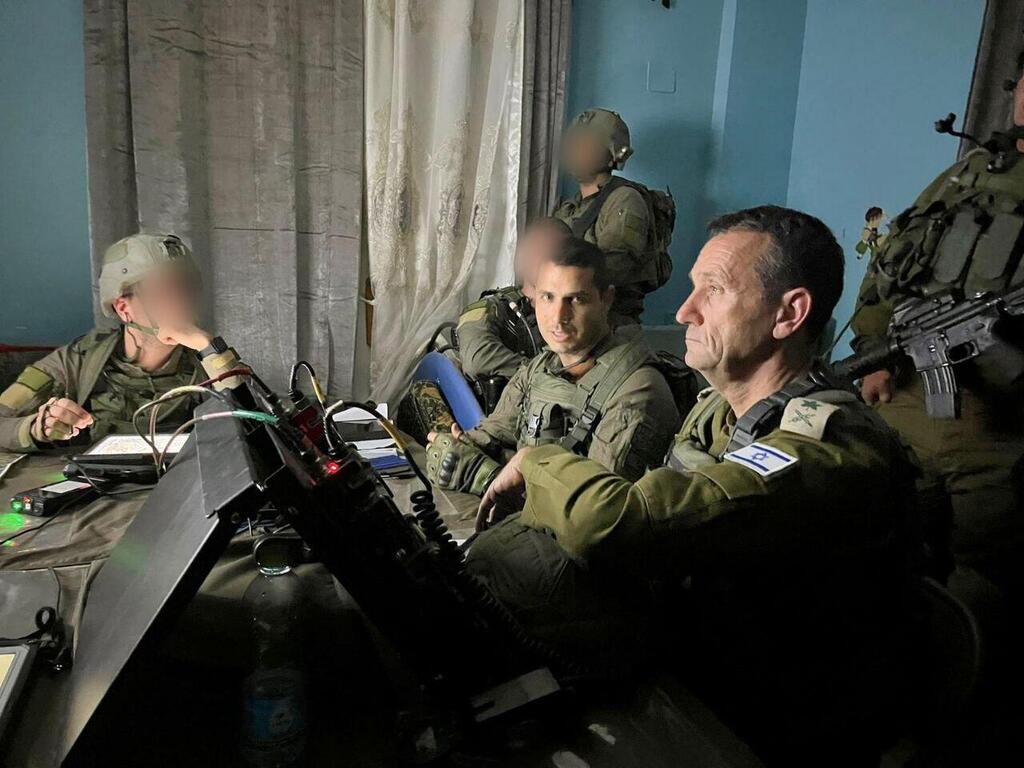Getting your Trinity Audio player ready...
The Israel Defense Forces has had huge spotlight shined right on it, ever since the Netanyahu government began being subjected to a barrage of protests, erroneously marked as "a protest against judicial reform."
Read more:
The phenomenon of IDF reservists refusing to enlist and the way protesters have capitalized on that phenomenon, have put the IDF chief of staff, Air Force commander and IDF spokesperson in the limelight. The public expectation for clear and unequivocal denunciation of reservists refusing to enlist, corresponded with increased public attention toward the reservists.
2 View gallery


IDF Chief of Staff Herzi Haleby visiting the Jenin refugee camp
(Photo: IDF spokesperson unit)
In stark contrast, the IDF was swift and adamant in defending Maj. Gen. Yehuda Fuchs, as well as the decision to rely on a Palestinian report regarding the events in the village of Burqa.
Lately it seems that any criticism, no matter how small, how relevant or how justified, against any senior member of the Israel Defense Forces - is immediately categorized by the media and by politicians as a reckless assault that damages IDF capabilities. So if any criticism against senior military officers is labeled as a dangerous assault, how must we label Palestinian stories?
Should you take in a lucid and unbiased look at a situation, it is easy to see the most egregious harm the IDF has sustained comes from reckless statements by Dan Halutz, Moshe "Bogey" Ya'alon, Ehud Barak and other former chiefs-of-staff. When the average Israeli notices how all of those former stalwarts hold the same position, use the same sort of rhetoric and position themselves in direct opposition to the same government, it makes them observe today's officers with a crooked eye.
The demand of relieving the army of any criticism
Similarly, as the public notices the former head of Shin Bet and former head of the Mossad are saying the most urgent and perilous existential threat to the state of Israel is the judicial reform and that its passage would merit refusing to show up for reserve duty, it makes them look at statements from today's heads of Shin Bet and Mossad through a political prism.
The harm this brings, in terms of erosion of public trust in the Israeli defense apparatus, cannot be overstated. That being said, there were other statements that have caught the lion's share of attention.
One of them was uttered a week ago by Knesset member Avihai Boaron, who said that Fuchs cares more about Palestinians' rights to move about freely than he does about the lives of his fellow Jews. This statement needs to be thoroughly examined, since the IDF spokesperson said his unit relies on reports emanating from the Palestinian side of the map.
And to those who say this has always been the case, I would like to direct your attention to past outrages by left wing Knesset members or IDF spokespersons against Nitzan Horowitz, who back in 2021, when he was still heading the left-wing Meretz party, expressed support for the International Criminal Court investigating IDF soldiers. Let me save you some time – there was no outrage.
Horowitz's statement caused immeasurable damage, since by claiming Israel performs war crimes, he put soldiers under either direct or indirect risk. The criticisms leveled today against IDF senior members from right-wing Knesset members are nowhere near as egregious.
 Naveh DromiPhoto: Courtesy
Naveh DromiPhoto: CourtesyI would go one step further and say that it is incumbent upon Knesset members to criticize IDF officers, while giving said officers a chance to respond. What is unreasonable is the demand to relieve the army of any criticism at all. Should we endeavor to promote a different military policy, it should be done by altering our perception of how the IDF and its senior commanders should operate, when it comes to dealing with threats emanating in the West Bank.
Further, I would like to ask this - In which western liberal democratic nation are you completely unable to criticize military personnel or policy, without immediately being unfairly labeled as a reckless provocateur?
The only way to truly correct the severe and deep crisis currently experienced in Israeli society, as well as the IDF, is not solely by criticizing reservists refusing to enlist, but also by addressing the way the military responds to outcries from both sides of the political aisle, as well as the way it delivers messages to the media. We are but everyday citizens, and as such deserve to have our grievances and concerns addressed, regardless of whether or not we became IDF generals ourselves.
Naveh Dromi is a columnist for various publications, and an analyst appearing on Channel 14


